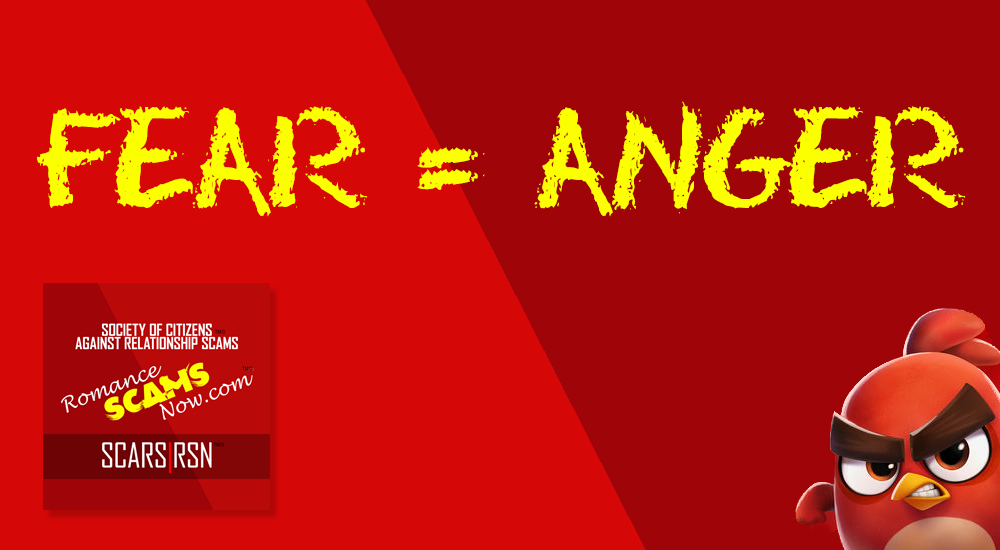
SCARS Institute’s Encyclopedia of Scams™ Published Continuously for 25 Years

SCARS™ Psychology Of Scams: Victim Response To Fear Is Anger!
After A Scam Many Victims Are In Panic And Experience Fear & Anger
[lwptoc]Victims Experience Real Trauma After The Scam Is Discovered And Then Fear Sets in
The panic can come from several directions:
- Fear caused by the realization that is was all lies
- Fear caused by the awareness of the risk of exposure – because of information shared with the scammer
- Fear caused by the amount of money and the financial impact that they will now have in their life
- Fear of discovery by family or friends or the outside world
- Fear from threats made by the scammer
- Fear from the total loss of control in their life
All of these are real fears that most victims experience.
But With Fear Comes Anger & Rage
Anger is the natural emotion created in a fight-or-flight situation by the mind in a threatening situation – such as the discovery of being scammed.
When a scam victim senses the threat or danger following the discovery of the scam the mind generates fear and anger.
The fear is part of a flight response. Anger is the emotional energy a victim generates for the fight against that perceived threat.
Confusing For A Victim
The Mind Creates Fear And Anger Even When The Threat Is Just Imagined
Emotions like anger are natural and real. Even if the threat is imagined the anger that is created is just as real and powerful.
However, the reasons a victim generates anger aren’t always real.
If the victim isn’t aware of how their mind is dealing with these imagined scenarios of hurt, threat or danger then their anger will appear irrational.
Real vs. Imagined Anger
It can sometimes be difficult to distinguish a real threat from an imagined threat because they can happen at the same time.
For example, someone is cutting you off on the freeway and a car briefly maneuvers in a way that could cause an accident and possibly injure your body. There’s a natural fight-or-flight reaction to your emotions and you create a combination of fear and anger. The reality of this harm usually passes very quickly and so do your emotions – though not always depending on the person. Some people experience a kind of shock afterward.
However, the imagination may take over and create worse scenarios of whatever the trauma of the experience was. The mind begins to consider all manner of worst-case scenarios that spiral upward and create ever greater stress.
The mind might recall similar events from the person’s past (powered by the Amygdala), projecting those into the mind uncontrollably, and add more emotional stress in the process. After the real physical threat (the scam and the aftermath) passes the mind still projects scenarios in the imagination. The emotions then respond to those imagined scenarios with feelings of fear and the resulting anger.
Even later the mind will replay the event over and over, and the person’s emotions respond to the imagined vision.
The emotions created from the imagined scenarios are no longer based on anything real but because of the natural response of emotions to what is imagined the mind can amplify fear and anger to the degree that they become out of control. However, fear and anger are the natural consequences of imagined scenarios.
The problem is that the imagined scenarios in the mind are out of control – in a kind of escalating spiral – and no longer are based in reality.
Then add outside triggers, such as a comment or action from another and this can lead to a complete rage that is then directed against an innocent person because they became a perceived threat.
Awareness Of These Emotions
Victims are generally not aware of how their imagination is projecting these scenarios and will blame other people unnecessarily for their emotions. Understanding how the mind creates images and scenarios of imagined outcomes is critical to understanding the anger and other emotions.
The initial moment of fear and anger resulted from a very real scenario that could have caused you harm – meaning the scam. However, most often the anger and fear people generate are sourced from their uncontrolled beliefs and imagination.
Irrational Perceptions
This fear and anger also drive irrational expectations in others. Victims frequently demand unrealistic performance of law enforcement and those attempting to assist them. These perceptions are driven by the victim’s own emotions and are not based upon the way the world really works or even the capabilities to those receiving their outbursts.
A perfect example of this is anger towards local police because they will not drop everything and get on a plane to go to Nigeria and arrest a scammer. The fear-driven anger blinds the victim to the real-world limitations and then causes further anger by the failure of the provider to do what the victim demands.
Such anger fueled irrational expectations are directed at anyone that does not do what the victim demands and expects. This not only alienates and isolates the victim but drives away anyone that is in a position to assist – both with the scam itself and with the victims own emotional recovery.
Anger Is Rational – Sometimes
Anger is the natural emotional response designed to protect us from danger.
It is part of everyone’s instinctual system for protection and preservation.
Examples of this are everywhere in nature, such as when an animal growls and bares its teeth in response to a threat to its territory. A mother bear will switch into ferocious anger if someone were to come near her cubs.
Anger is a force of energy that people also project in order to push away or combat a threat. However, anger ceases to be a form of protecting life and becomes a means of destroying life and relationships when the threat isn’t real.
Each person’s emotions typically respond the same whether a threat is real or imagined.
Anger itself is a completely rational emotion to have when there is awareness of threat scenarios in the mind. There is nothing mechanically wrong with the anger from imagined scenarios and beliefs – because the mind is capable of extrapolating threats from minimal information. The mind’s emotional response system is working properly in these cases.
The problem is with the thoughts, beliefs, and imagined scenarios themselves – when there is no real basis for them and that generate an irrational anger response. The scenarios the mind projects in these cases are not rational at all.
Reactions And Consequences
Problems are created when the person does not have the necessary awareness or will power to refrain from outbursts of anger.
These reactions and consequences often distract us from the root cause of the problem. It’s easy to assume that anger is the problem because it is what is noticed. It is the outbursts of anger that are seen and that cause the destruction.
The assumptions and interpretations in the mind are less noticeable amidst this emotional drama. However, emotions of anger are just a natural response to what the mind imagines. If a person perceives and believes what the mind imagines it will create emotions as a natural response or consequence.
A person may want to stop their anger, but anger is just a reaction to something else. Anger is the natural emotional reaction to what the mind and imagination are doing. If the person is not aware of this process, then they will simply let the anger loose on anyone in their way.
Changing The Perception Of Threat
The way to overcome anger is to try to understand the root cause and alter the perception of threat.
It is vital to change how the mind imagines the situation and understand the reality of the situation. When the mind imagines painful scenarios it naturally produces fear and that can lead to anger.
To reduce and eliminate the anger it is necessary to shift the perception that the mind has imagined. This is where the recovery process is important and can play a large role in shifting perceptions and expectations, but the person or scam victim has to be willing to embrace the process or it will fail.
Reactions to Emotional Pain
The mind can generate anger and fear even when there’s not a physical threat of pain or danger. The emotional response mechanisms can generate anger just as easily by imagining a scenario involving the threat of emotional pain or remembering it also.
When the mind is out of control imagining or remembering scenarios of emotional pain, the anger can easily get out of control.
For anger (rage, hate, etc.) to happen the emotional pain doesn’t even have to occur. If the victim just remembers it that is sufficient, or imagines that there will be hurt in the future (such as financial pain) the person can become angry before anything has actually happened.
Misplaced Blame
In a romance scam scenario, there are numerous opportunities for post-scam blame.
The victim feels shame or fear from the financial loss, or there can be threats from the scammer or just baseless fear from sharing so much about themselves with a fraudulent stranger. These are irrational perceptions of danger. They all trigger blame.
At that point, because the victim is under these fear and anger stressors any external actions that go contrary to what the victim perceives or believes should happen will result in immediate blame – either self-blame or against others as a means of avoiding their own involvement.
It is very typical for romance scam victims to blame a large array of people following the scam:
- Themselves for being “stupid” to fall for it
- The technology provider that allowed it to happen
- The financial institution that did exactly what the victim asked them to do
- Their family or friends for not saving them or stopping it
- Assistance providers who are not doing what the victim demands
- The police for not investigating and arresting someone
Of course, no one does anything or understands anything. This is something that victims’ assistance and support providers hear a thousand times a day. This is the misplaced blame speaking.
These judgments are really an avoidance of self-judgment that attack the victim’s self-image. These self-criticisms result in hurtful emotional pain. One of the possible reactions to this type of emotional pain is to create anger to push away the cause.
Typically the victim is not aware of how their mind creates the self-judgment and emotional harm and they will simply blame others. It is common that the hurt feelings translate from perceptions of disrespect or insult from others further triggering greater levels of anger. The mind draws a simple relationship between anyone’s action as the cause and the pain as the effect.
Without awareness, the victim overlooks or simply does not see the emotionally damaging self-judgment that their mind has created and only notices the triggering behavior of others. Thus directing anger at anyone to punish them for their behavior – real or imagined.
Not only does this damage necessary relationships that the victim needs to survive the experience and recover, but it does not address the real cause of the pain – which is the underlying trauma experienced from the scam.
Anger In A Vacuum
Without self-awareness, the scam victim is likely to misconstrue the cause of their pain.
Victims make the assumption that someone else’s behavior or possible behavior is hurtful them and threatening them emotionally. The result is anger, rage, and even hate.
When a victim becomes angry at other victims, police, or support professional based upon interactions depending on the situation and the victim’s assumptions, the anger can easily explode. The victim is unable to properly conclude that their mind is generating threatening scenarios and reacting irrationally. This dynamic of irrational reactions can completely destroy their critical relationships and either stall their emotional recovery or result in potential mental health issues that may require professional counseling or therapy to correct.
Rational Self-Awareness Is Key
Every victim will feel fear, and there will come anger. After all, this is a grieving process.
However, the important point is to have enough self-awareness to see that the cause of the pain lies in the internalized trauma from the scam, and their own imagination or beliefs about themselves and their situation. As awareness gains traction each victim can address their core beliefs behind their pain and change to overcome the real cause of the fear and resultant anger.
It is the realists that successfully recover from the trauma of a scam. Those that remain trapped in denial caused by their fear, or those exploding in anger cannot make the connections so necessary to recover, much less possess the self-awareness needed to work through their internal pain.
PLEASE SHARE OUR ARTICLES WITH YOUR CONTACTS
HELP OTHERS STAY SAFE ONLINE
SCARS™ Team
A SCARS Division
Miami Florida U.S.A.
TAGS: Scam Victims, Mind, Imagination, Rational Fear, Rational Anger, Irrational, Fear, Anger, Rage, Hate, Scammers, Trauma, Self-Awareness
CHAT WITH SCARS™ – « CLICK HERE » [icon name=”comment” class=”” unprefixed_class=”2x”]
END
MORE INFORMATION
– – –
Tell us about your experiences with Romance Scammers in our
« Scams Discussion Forum on Facebook »
– – –
FAQ: How Do You Properly Report Scammers?
It is essential that law enforcement knows about scams & scammers, even though there is nothing (in most cases) that they can do.
Always report scams involving money lost or where you received money to:
- Local Police – ask them to take an “informational” police report – say you need it for your insurance
- Your National Police or FBI « www.IC3.gov »
- The SCARS|CDN™ Cybercriminal Data Network – Worldwide Reporting Network « HERE » or on « www.Anyscam.com »
This helps your government understand the problem, and allows law enforcement to add scammers on watch lists worldwide.
– – –
Visit our NEW Main SCARS Facebook page for much more information about scams and online crime: « www.facebook.com/SCARS.News.And.Information »
To learn more about SCARS visit « www.AgainstScams.org »
Please be sure to report all scammers
« HERE » or on « www.Anyscam.com »
Legal Notices:
All original content is Copyright © 1991 – 2020 SCARS All Rights Reserved Worldwide & Webwide. Third-party copyrights acknowledge.
SCARS, RSN, Romance Scams Now, SCARS|WORLDWIDE, SCARS|GLOBAL, SCARS, Society of Citizens Against Relationship Scams, Society of Citizens Against Romance Scams, SCARS|ANYSCAM, Project Anyscam, Anyscam, SCARS|GOFCH, GOFCH, SCARS|CHINA, SCARS|CDN, SCARS|UK, SCARS Cybercriminal Data Network, Cobalt Alert, Scam Victims Support Group, are all trademarks of Society of Citizens Against Relationship Scams Incorporated.
Contact the law firm for the Society of Citizens Against Relationship Scams Incorporated by email at legal@AgainstScams.org
-/ 30 /-
What do you think about this?
Please share your thoughts in a comment below!
Table of Contents
LEAVE A COMMENT?
Recent Comments
On Other Articles
- Arwyn Lautenschlager on Love Bombing And How Romance Scam Victims Are Forced To Feel: “I was love bombed to the point that I would do just about anything for the scammer(s). I was told…” Feb 11, 14:24
- on Dani Daniels (Kira Lee Orsag): Another Scammer’s Favorite: “You provide a valuable service! I wish more people knew about it!” Feb 10, 15:05
- on Danielle Delaunay/Danielle Genevieve – Stolen Identity/Stolen Photos – Impersonation Victim UPDATED 2024: “We highly recommend that you simply turn away form the scam and scammers, and focus on the development of a…” Feb 4, 19:47
- on The Art Of Deception: The Fundamental Principals Of Successful Deceptions – 2024: “I experienced many of the deceptive tactics that romance scammers use. I was told various stories of hardship and why…” Feb 4, 15:27
- on Danielle Delaunay/Danielle Genevieve – Stolen Identity/Stolen Photos – Impersonation Victim UPDATED 2024: “Yes, I’m in that exact situation also. “Danielle” has seriously scammed me for 3 years now. “She” (he) doesn’t know…” Feb 4, 14:58
- on An Essay on Justice and Money Recovery – 2026: “you are so right I accidentally clicked on online justice I signed an agreement for 12k upfront but cd only…” Feb 3, 08:16
- on The SCARS Institute Top 50 Celebrity Impersonation Scams – 2025: “Quora has had visits from scammers pretending to be Keanu Reeves and Paul McCartney in 2025 and 2026.” Jan 27, 17:45
- on Scam Victims Should Limit Their Exposure To Scam News & Scammer Photos: “I used to look at scammers photos all the time; however, I don’t feel the need to do it anymore.…” Jan 26, 23:19
- on After A Scam, No One Can Tell You How You Will React: “This article was very informative, my scams happened 5 years ago; however, l do remember several of those emotions and/or…” Jan 23, 17:17
- on Situational Awareness and How Trauma Makes Scam Victims Less Safe – 2024: “I need to be more observant and I am practicing situational awareness. I’m saving this article to remind me of…” Jan 21, 22:55
ARTICLE META
Important Information for New Scam Victims
- Please visit www.ScamVictimsSupport.org – a SCARS Website for New Scam Victims & Sextortion Victims
- Enroll in FREE SCARS Scam Survivor’s School now at www.SCARSeducation.org
- Please visit www.ScamPsychology.org – to more fully understand the psychological concepts involved in scams and scam victim recovery
If you are looking for local trauma counselors please visit counseling.AgainstScams.org or join SCARS for our counseling/therapy benefit: membership.AgainstScams.org
If you need to speak with someone now, you can dial 988 or find phone numbers for crisis hotlines all around the world here: www.opencounseling.com/suicide-hotlines
A Note About Labeling!
We often use the term ‘scam victim’ in our articles, but this is a convenience to help those searching for information in search engines like Google. It is just a convenience and has no deeper meaning. If you have come through such an experience, YOU are a Survivor! It was not your fault. You are not alone! Axios!
A Question of Trust
At the SCARS Institute, we invite you to do your own research on the topics we speak about and publish, Our team investigates the subject being discussed, especially when it comes to understanding the scam victims-survivors experience. You can do Google searches but in many cases, you will have to wade through scientific papers and studies. However, remember that biases and perspectives matter and influence the outcome. Regardless, we encourage you to explore these topics as thoroughly as you can for your own awareness.
Statement About Victim Blaming
SCARS Institute articles examine different aspects of the scam victim experience, as well as those who may have been secondary victims. This work focuses on understanding victimization through the science of victimology, including common psychological and behavioral responses. The purpose is to help victims and survivors understand why these crimes occurred, reduce shame and self-blame, strengthen recovery programs and victim opportunities, and lower the risk of future victimization.
At times, these discussions may sound uncomfortable, overwhelming, or may be mistaken for blame. They are not. Scam victims are never blamed. Our goal is to explain the mechanisms of deception and the human responses that scammers exploit, and the processes that occur after the scam ends, so victims can better understand what happened to them and why it felt convincing at the time, and what the path looks like going forward.
Articles that address the psychology, neurology, physiology, and other characteristics of scams and the victim experience recognize that all people share cognitive and emotional traits that can be manipulated under the right conditions. These characteristics are not flaws. They are normal human functions that criminals deliberately exploit. Victims typically have little awareness of these mechanisms while a scam is unfolding and a very limited ability to control them. Awareness often comes only after the harm has occurred.
By explaining these processes, these articles help victims make sense of their experiences, understand common post-scam reactions, and identify ways to protect themselves moving forward. This knowledge supports recovery by replacing confusion and self-blame with clarity, context, and self-compassion.
Additional educational material on these topics is available at ScamPsychology.org – ScamsNOW.com and other SCARS Institute websites.
Psychology Disclaimer:
All articles about psychology and the human brain on this website are for information & education only
The information provided in this article is intended for educational and self-help purposes only and should not be construed as a substitute for professional therapy or counseling.
While any self-help techniques outlined herein may be beneficial for scam victims seeking to recover from their experience and move towards recovery, it is important to consult with a qualified mental health professional before initiating any course of action. Each individual’s experience and needs are unique, and what works for one person may not be suitable for another.
Additionally, any approach may not be appropriate for individuals with certain pre-existing mental health conditions or trauma histories. It is advisable to seek guidance from a licensed therapist or counselor who can provide personalized support, guidance, and treatment tailored to your specific needs.
If you are experiencing significant distress or emotional difficulties related to a scam or other traumatic event, please consult your doctor or mental health provider for appropriate care and support.
Also read our SCARS Institute Statement about Professional Care for Scam Victims – click here to go to our ScamsNOW.com website.














![Financial Recovery - Avoid Money Triggers - Perspective on Money for Scam Victims - 2023 [UPDATED 2025] Financial Recovery Money Triggers Financial Recovery - Avoid Money Triggers - Perspective on Money for Scam Victims - 2023 [UPDAYED 2025] - on the SCARS Institute RomanceScamsNOW.com - the Encyclopedia of Scams™](https://romancescamsnow.com/wp-content/uploads/2025/06/Financial-Recovery-Money-Triggers.png)
![Why People Blame Scam Victims? Stop Scam Victim Blaming - [UPDATED 2025] Why People Blame Scam Victims 2025 Why People Blame Scam Victims? Stop Scam Victim Blaming - [UPDATED 2025] - on the SCARS Institute RomanceScamsNOW.com - the Encyclopedia of Scams™](https://romancescamsnow.com/wp-content/uploads/2021/11/Why-People-Blame-Scam-Victims-2025.png)





Thank you for your comment. You may receive an email to follow up. We never share your data with marketers.